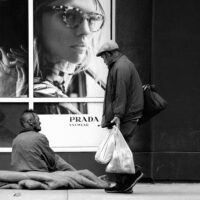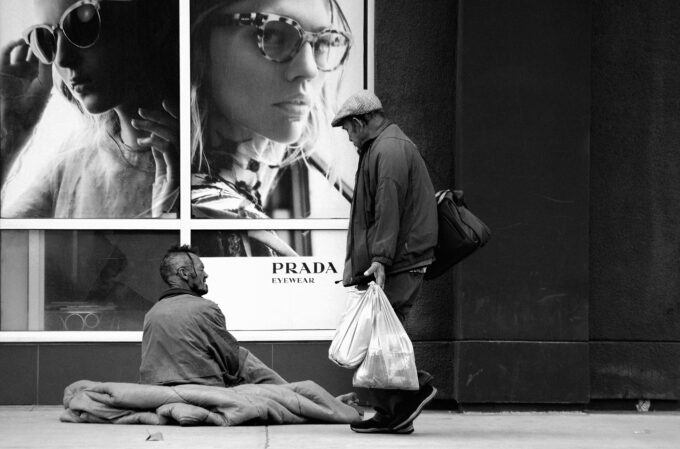

Image by Max Böhme.
In the minds of many, the US state of Vermont is an idyllic place of trees, mountains, ski resorts, craft beer and people with lots of money. In all honesty, Vermont does have its share of all these things. However, like any other place in the world’s capitalist economy, they come at a price. Until recently, that price was mostly hidden from the bulk of Vermont’s residents and even more of its visitors. However, the combination of the COVID-19 pandemic and the drastic reordering of that capitalist economy that followed has revealed the ugly underside of Vermont’s picture-book reality. Like most of the rest of the world, the unhoused live on the streets of the state’s small cities, panhandling, living out their lives’ dramas and wondering where they can sleep out of the cold. An epidemic of drug addiction uglier than any I have ever seen makes its presence known in those streets, in the property crime statistics and in the numbers of overdoses reported by various public health officials and police. Given the visual evidence, I can’t help but wonder how many more addicts hide behind their rural and suburban homes.
As is all too often the case across our nation, Vermont’s governor is joining the chorus of those calling for more people to be put in prison because the media and various conservative groups are exaggerating the crime situation in Vermont. The question is how many liberal legislators will go along with the governor’s alarmist and reactionary rhetoric. Already, how to respond to the rise in illegal activity in the state’s largest city, Burlington, is becoming a major election issue in the contest between the candidates.
It is clear to most people that illegal drug use is up in the United States. The drugs being used are addictive and potentially fatal. Many of those using them are often without a place to stay. Many are also without much of an income beyond what they can raise through various, usually petty, criminal activities. These factors are what the law and order folks point to when they call for more police, harsher penalties and more incarceration. While this response might seem reasonable on an emotional level, it does little to nothing actually to address the problems drug addiction and the associated crime are the symptoms of. As readers in other states are most certainly thinking, no place is immune from the pain that capitalism brings.
An essential fact that is true across the United States is that houselessness is increasing and the cost of housing is beyond the reach of many US residents. Here in Vermont, apartments that rented for a thousand dollars a decade ago are now costing tenants close to twice as much if not more. Meanwhile, while wages have increased, so has the cost of almost everything else including food, fuel and clothing. Consequently and in relative terms, those increased wages often buy less than lower wages bought in 2010. There’s a reason for this. It begins on Wall Street and goes on to Washington, DC.
Tax cuts to the rich and an ever-increasing military/war budget are decisions reflecting the priorities of those who rule and the people who fund those who end up in office. Some of us put all the blame for this on one or the other of the two major parties. An unfortunate truth, though, is that both parties represent the interests of the wealthy—especially the war and fossil fuel industries and the financial houses—more than they represent workers, students, retired folks or any other segment of the US population. Each party’s candidates may get more funding from one or another PAC, foundation, industry or wealthy individual, but almost all of them get most of their money from the ruling elites in this country. Yes, there are some exceptions to that general rule—and those candidates deserve acknowledgment for their attempt to remain untainted. However, the numbers of the “untainted” are so small the only role they can play is one of a voice crying in the wilderness.
We do need to address the epidemic of addiction across the United States. We also need to address the growing poverty, cost of housing and the rising rate of food insecurity. While we’re at it, we should address the need for affordable education and training opportunities for those without income but wanting to work. These issues will not be solved by locking up more people and building more prisons. They won’t be solved by cutting education budgets and closing down affordable colleges. They won’t be solved by throwing people off of food subsidies like EBT or by taking away their Medicaid. Hiring more police will not solve these problems. Sure, locking people up might clear the streets of the poor that seem to make some non-poor folks uncomfortable. It might even help some people kick their addiction. However, as a general rule, investing in incarceration and having police clean up those left by the wayside in an incredibly unequal and harsh economy solves nothing. Long-term investing in low-income housing, education, and social services can and usually does. It’s true that in many places in the United States, politicians and public bureaucrats either reject this truth or even delight in abusing the poor. The fact that many other places governed by supposedly more liberal and enlightened folks enact the same policies as these reactionaries is a testament to both the lies of politicians and their servitude to the harsh theology of capitalism completely off its chain.
The post Unchained Capitalism: A Demonic Theology appeared first on CounterPunch.org.
This post was originally published on CounterPunch.org.

